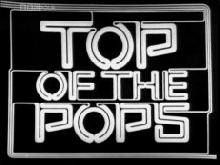
TV Pop Diaries
Pop Music on British Television 1955 -
The BBC had been considering a response to Associated Rediffusion's successful and
trend-
Producer Stewart had previous experience in pop and light entertainment for BBC Television working on pop shows Juke Box Jury, Twist! and The Trad Fad, so was the most likely to get a show of this nature commissioned. The show format was devised by Savile and Colehan and a pilot was ordered for late 1963. The title Teen and Twenty Record Club had briefly been considered, but since it was associated with a Radio Luxembourg show a new name had to be produced. It was Stewart who had suggested the title 'Top of the Pops'. It was however not a new name as it had been used before back in the 1950s for a BBC Light Programme radio series, and it would also be used again by the BBC's Transcription department for a weekly World Service radio show in the sixties, hosted by Brian Matthew.
The pilot was recorded at the location that would become the home of the show for
the first two years, a converted Wesleyan church in Dickenson Road, Rusholme, Manchester,
formerly the home of Mancunian Films. The format devised would concentrate on hit
singles, rather than anyone that happened to be available, but it was the Head of
Light Entertainment Bill Cotton Jnr who suggested that it should concentrate on the
top twenty. This format would make the show more of a crowd-
Since the show is based on what the public is buying a chart, from the many available, had to be chosen. They decided to use the music paper charts for the first few years, although this is never mentioned on screen.
The show is publicly announced in the Daily Mirror on 21st November 1963, where a BBC spokesman tells the paper "We want to have the exact sound on the record in the charts, so we are waiving the 'no miming' rule. But this does not show any change in our basic attitude to the miming of discs. We feel that just to have an artist come on and shape his mouth to the words of his or her record is lazy and dishonest."
Talking to The Stage in December 1963, a few weeks' ahead of the first show Stan
Parkinson, assistant to producer Johnnie Stewart stated that the records would be
chosen from those going up the top twenty/thirty as well as the top three. Also the
ban on miming would be relaxed "to let viewers hear the discs as recorded within
the setting of a television production". Talking to Radio Times ahead of the first
show Stewart claimed "It's like doing the pools, I have to anticipate who's going
up, who's falling back. My bush telegraph brings me the new chart at tea-
Several rules would be implemented over time -
Much has been made of Jimmy Savile and Johnnie Stewart having to guess the what the chart would look like a few weeks' ahead, but choices made in early December included Heinz and Brian Poole & The Tremeloes, neither of which were in the top ten on the week of transmission.
The choice of hosts for the show was not going to be difficult, with Jimmy Savile a top DJ, albeit on Radio Luxembourg, as was David Jacobs who had previously hosted the BBC Light Programme's Pick of The Pops, Alan Freeman, the then current Pick Of The Pops host and radio favourite Peter Murray, who was also a familiar face from the 6.5 Special days. He later claimed he was asked to be the permanent host by Stewart, but said that he would only do it once a month, fearing that he would be too associated with one show.
The debut couldn't have come at a better time for the BBC. Pop music shows had started making their presence felt in the Television Audience Measurement top ten ratings. Thank Your Lucky Stars had been in the top ten twice in summer 1963, while It's The Beatles, their appearance on Sunday Night at the London Palladium, Juke Box Jury and the Royal Command Performance also took pop music into millions of homes the month before the The Pops' first show. However, it has to be noted that Top Of The Pops itself never once reached the top ten ratings in the sixties.
Despite a no-
The decades -
The 1960s -
For more detailed information about the early years of the show I recommend The Lost
Years Rediscovered 1964 -
TOP OF THE POPS
BBC/BBC1/BBC2
1st January 1964 -
